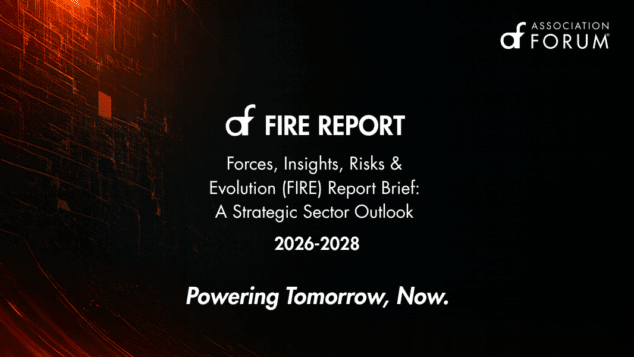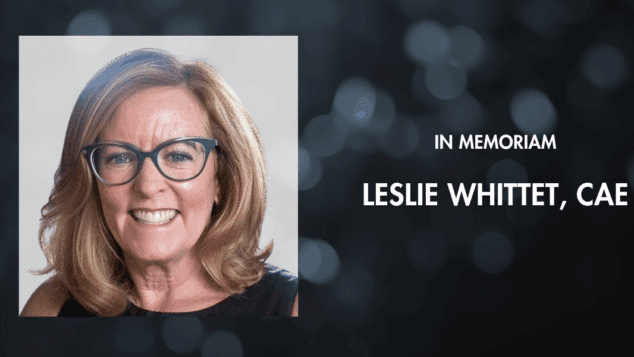SmartTech 2020 Focuses on New Tech While Also Putting People First

Association Forum has been delivering cutting-edge content to association professionals for years. But SmartTech 2020 was different. Not only was the conference virtual, but it was also a sorely needed reminder that there is progress to be made during these unprecedented times.
Simona Rollison kicked off the conference with a video of Steve Jobs. In it, a young Jobs sits and looks at the camera and tells us, “Everything you call life was made up by people no smarter than you.” And, he asserts, once you shake off the idea that you have to live in it, you can embrace it, change it and improve upon it. These were welcomed words for the year 2020. Who among us isn’t tired of just living in this life? This year has shown us that under the most extreme circumstances, we must shape our lives and change our own realities.
Rollison is the chief technology officer for ISACA, which serves more than 140,000 business and IT leaders worldwide. She discussed her career path and how her work experiences shaped her as a professional, including as a woman in tech, the former president of a software company and as the chief information officer of Cook County.
“Technical debt, like financial debt, accumulates and snowballs,” she told the virtual crowd. This emphasized her point of keeping up with technology. She said that you can’t counterfeit value, and you can’t build security into tech that wasn’t built with security in mind. For these reasons, trying to hack your outdated tech and bring it up to speed isn’t going to work long term. Hence, if your organization is running on a Frankenstein system of outdated tech, you’re accruing technical debt and inviting mounting bugs, security risks and all-around inefficiency.
Rollison also shared findings from an ISACA research study that asked IT professionals about the future of the industry. According to the results, 81% of IT professionals felt that enterprises are not investing enough in needed skills and 70% felt that they aren’t investing enough in needed technology. She urged attendees to make changes now and to embrace technology.
While some attendees may see the association model as an obstacle for building out the latest technology, Rollison sees opportunity. She says that associations are strong because they are often small and therefore nimble. Members choose to be a part of our organizations. While members can be demanding, their loyalty is key to the business model. What’s more, associations are time-tested. We’ve proven over and over again that we can evolve and offer new benefits and modern resources. “We’re like startups, but we don’t have to fundraise,” she said.
Breakout Sessions
John Kampas is the founder and CEO of EMPIST, a Chicago-based technology company. He presented “Cybersecurity Fundamentals for Associations: How to Avoid Becoming a Cybercrime Statistic.” Kampas provided attendees with the vernacular of cybercrime and practical steps to prevent it — he also sufficiently rattled everyone a bit. In truth, 61% of organizations experience a cyber incident, Kampas said. While this is disheartening, Kampas discussed how to simulate an attack to ensure you’re ready. He also went over password use and the top vulnerabilities for an attack.
Meanwhile, a panel of association executives sounded off on the breakout session “Bridging the Gap Between CEO and Technology Executives to Achieve Digital Transformation (Pop-Up Edition).” This session used speech bubble pop-ups to add to the conversation, providing a clever commentary reminiscent of VH1’s Pop-Up Videos.
The group discussed the great challenges of the past seven months, specifically the tech challenges that have arisen due to global changes from the COVID-19 pandemic. Katherine Matthews, CAE, a business intelligence analyst for the National Council of Architectural Registration Boards, said that while data was already trendy, the shift to all-virtual programming had people banging down her door for analytics. Now, more than ever, organizations are aware of the importance of measuring virtual footprints and the experience of its users.
Bob Moore, MA, CAE, executive director of the American College of Osteopathic Family Physicians, listed several pieces of technology that have been helpful to him, including Microsoft Teams. He also said that he sends biweekly surveys to staff as a “pulse check.” These surveys are quick and anonymous. He asks employees how they are feeling, if they are being supported and if they are feeling productive. These have helped to replace the nonverbal communication you’d get in an office environment — just walking up and down the office and popping in to check on staff.
Other suggestions from the group included: implementing a board management platform so that you can collaborate virtually; creating a lean budget for 2021 but also keeping a wishlist in case things improve; using technology to connect with staff, including sites to play trivia, share photos and even color; and preparing to keep some virtual adjustments after the pandemic has passed.
Jeff De Cagna, FRSA, FASAE, is an executive advisor for Foresight First LLC and presented “Will Humans Be Second?: Critical Ethical Choices for the Coming AI-First World.” De Cagna went over why he believes this decade to be the “turbulent twenties” and how AI will play a major role in that turbulence. He also urged associations to focus on the responsible integration of human and machine intelligence. This led the discussion towards ethics and De Cagna enumerated the ethical consideration of AI.
Later, Jeanne Sheehy, CMO of Bostrom, presented “AI as a Tool to Improve Operations and Advance Association Missions.” She noted the difference between ANI and AGI. ANI is narrow AI, meaning that machines can do one narrow task that a human can. AGI is general AI, meaning that machines can complete complex intellectual tasks much like a human would. While ANI is already prevalent, Sheehy told attendees not to worry too much about AGI just yet — most of that is still only in the movies.
In another session, Melinda Starkweather, principal of Starkweather Association Services, discussed “How Change Management Can Support Your Technology Adoption.” She kicked off the session by telling attendees: “I don’t need to take a poll to know how much change you have been experiencing.” She called the past seven months of working from home and dealing with the pandemic an “agility boot camp” for organizations. And while that agility can be good, there needs to be guidance around the new technology that’s being implemented. Starkweather coached attendees on how to increase buy-in and adoption of new technologies from your team. She also discussed scenarios where miscommunication led to failed implementations, or worse, an employee resigning.
One attendee wrote in the session chat: “Leaders are so powerful when they help people connect the changes to the goals to the team member’s individual goals. I’ve seen people feeling the disconnect throw the project sideways. It’s so painful.”
As the day progressed, machine learning and data were hot topics. Attendees learned how to increase member retention through machine learning, as well as how strategic plans should take data strategy into consideration.
Finally, the closing keynote addressed “Data Literacy — the Human Aspect of Data.” Jordan Morrow, global head of data literacy at Qlik, spoke about creating a common language around data. He urged attendees to build stories around their data and work that into their analysis. Data isn’t any good if your stakeholders and team members can’t understand it.
Morrow closed with a plea to invest in people first and then technology. For all the talk of data, AI, cybersecurity and technology — it turns out that people are still the difference-makers in their organizations.
![]() Did you miss SmartTech 2020? Purchase session recordings here.
Did you miss SmartTech 2020? Purchase session recordings here.
Tags
Related Articles
Association Forum Releases the 2026 FIRE Report, a Strategic Signal for a Sector in Transition
Association Forum unveiled the 2026 FIRE Report at Holiday Showcase, delivering strategic intelligence to help...
In Memoriam: Leslie Whittet, CAE
Association Forum mourns the loss of Leslie Whittet, CAE, a beloved leader whose passion, kindness,...
Work/Life: What Tech Tools Have Helped Shape Your Work and Life?
Technology touches everything from our professional work to our personal downtime. Association professionals tell us...




